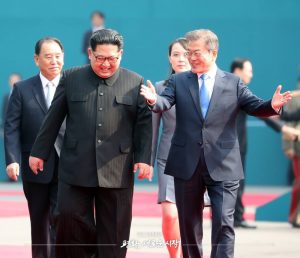On Tuesday, North Korea announced that it would cut off all communication linkages with South Korea, effective noon that same day. This includes the inter-Korean military communication hotline, the inter-Korean general hotline, and the hotline between the South Korean presidential office, the Cheong Wa Dae, and the Workers’ Party of Korean Central Committee.
“The East and West Seas communication lines between the militaries of the north and the south, the inter-Korean trial communication line and the hotline between the office building of the Central Committee of the WPK and the Chongwadae [will be cut off] from 12:00 on June 9. 2020,” North Korea’s Korean Central News Agency said.
“This measure is the first step of the determination to completely shut down all contact means with south Korea and get rid of unnecessary things,” KCNA added. “We have reached a conclusion that there is no need to sit face to face with the south Korean authorities and there is no issue to discuss with them, as they have only aroused our dismay.”
The communications cut-off — ordered by top officials Kim Yo Jong, North Korean leader Kim Jong Un’s sister, and Kim Yong Chol — marks the apotheosis of long-pending North Korean frustration with South Korea. In recent months, Pyongyang’s criticism toward the South has grown after a period of intense inter-Korean diplomacy and rapprochement through 2018.
In 2018, Kim Jong Un met South Korean President Moon Jae-in for two official summits: in April at the inter-Korean border peace village of Panmunjom and in September in Pyongyang. The two met for an impromptu meeting in May that same year, after U.S. President Donald J. Trump had canceled the first scheduled meeting between him and Kim.
Much of Pyongyang’s frustration stems from South Korea’s unwillingness to do business with the North in contravention of its international sanctions obligations. South Korea’s pro-engagement government, too, has been unable to convince the United States, its ally, to fundamentally change its North Korea policy to allow for the possibility of sanctions relief.
By the middle of last year, North Korea had already begun to turn against South Korea. In November last year, for instance, on the anniversary of the 2010 shelling of Yeonpyeong Island by North Korean artillery units in one of the worst instances of post-Korean War violence between the two sides, Kim Jong Un visited a frontline artillery unit of the Korean People’s Army, observing an exercise.
This year, several North Korean statements had criticized South Korea. In the days leading up to Tuesday’s announcement, Pyongyang criticized Seoul for allowing civil groups to launch anti-regime leaflets across the inter-Korean border.
Tuesday’s actions mirror a similar North Korean crackdown on inter-Korean contacts in March 2013. That moment initiated a broad, multi-year campaign of North Korean insularity as the country embarked on a major missile testing campaign that concluded by the end of 2017.
South Korea’s Moon, now in the second half of his single five-year term, will have to decide how to move next. In his April mid-term address, he indicated that he remained committed to engagement with North Korea. Seoul, too, has tried to effectively do everything it can short of violating international sanctions when it comes to engagement with North Korea.
In May, South Korean authorities provided for a unilateral reinterpretation of older unilateral sanctions —the so-called “May 24 Measures” — that would see these measures go effectively unenforced. In April, the South Korean leadership also sought to discourage rumors around Kim Jong Un’s health; later that same month, the South Korean leadership downplayed the significance of an incident in which North Korean soldiers fired on a South Korean guard post in the Demilitarized Zone.
None of this was enough, however. What North Korea sought from South Korea — sanctions relief — was never Seoul’s alone to give. While Tuesday’s step is evidence that the North is fed up with the South, it’s likely also a bid at hard bargaining.

































